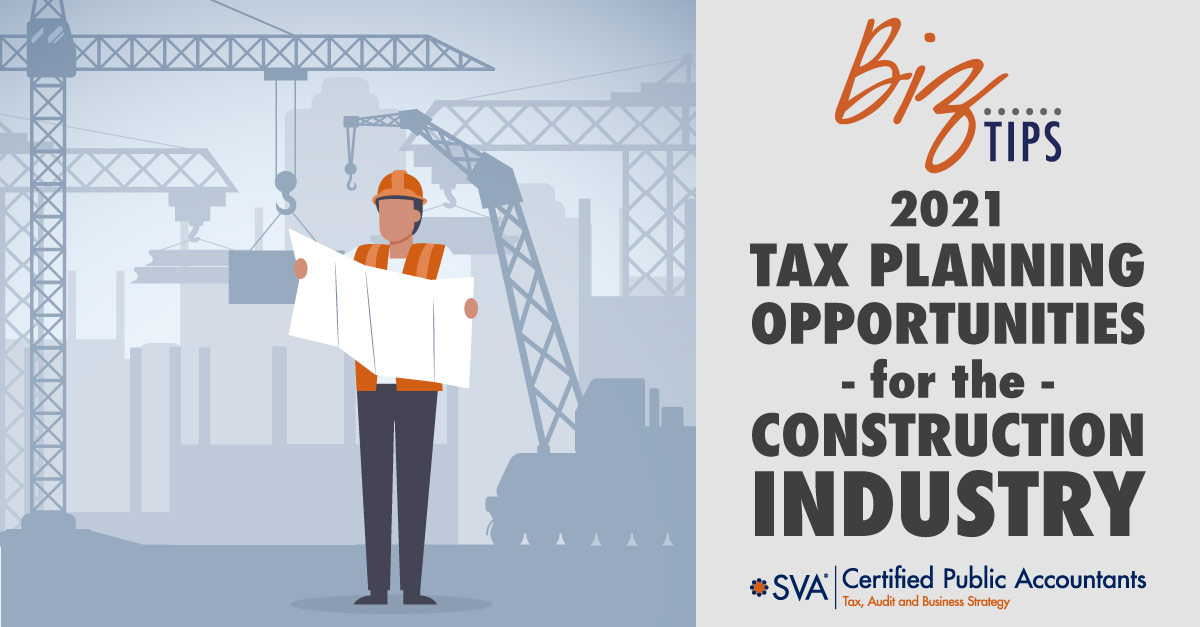The newly released CICPAC 2021 Tax Planning Opportunities for the Construction Industry highlights many opportunities for the construction industry as owners plan ahead.
The Tax Cuts and Jobs Act (TCJA) made significant tax changes and the Coronavirus, Aid, Relief, and Economic Security (CARES) Act modified some of those changes. There is a lot to understand between these two pieces of legislation and careful consideration should be taken when planning in 2021 and beyond.
CICPAC 2021 Opportunity Highlights
Some of the highlights include:
Section 199A:
Section 199A provides a 20% deduction on the amount of Qualified Business Income (QBI) for a partnership, S corporation, sole proprietorship, trust, or estate. It is limited by each taxpayer's taxable income range and their business's industry. Specified Service Trade or Businesses (SSTB) can reduce or eliminate the amount of deduction received. There are additional limitations discussed in the full report.
Excess Business Losses:
The TCJA brought in some unfavorable rules around the deductibility of excess business losses. The maximum annual business loss is $500,000 for joint filers and $250,000 for singles. The CARES Act modifies the limit on this computation for taxable incomes for 2018, 2019, and 2020. However, as 2021 ends, the limitation is now in effect and should be incorporated into annual tax planning moving forward through 2025. There is a lot to understand about the complexity of calculating this deduction and working with your advisor is the best option to ensure you are appropriately utilizing this opportunity.
Net Operating Losses (NOLs):
The CARES Act passed in 2020 updated the Net Operating Loss rules by allowing a 5‐year carryback and removing the 80% of Taxable Income Rule. This applies to NOLs only from 2018, 2019, or 2020. After 2020 and from now on, the treatment of net operating losses reverts to the rules provided by the TCJA, for which NOLs can only be carried forward and carrybacks are not allowed. Additionally, an NOL can only offset 80% of taxable income for losses carried over from post-2017 tax years. This includes the remaining losses generated in 2018‐2020. This means that you cannot shelter 100% of your regular taxable income.
Bonus Depreciation:
The TCJA brought some significant changes to the treatment of bonus depreciation. First, the bonus depreciation amount increased from 50% to 100% acquired after September 27, 2017 through 2022 and will phase down to zero over a 5‐year period after that. Secondly, the TCJA removed the requirement that the original use of qualified property must commence with the taxpayer. In other words, new AND used assets are eligible for bonus depreciation. On September 21, 2020, the IRS issued final regulations for bonus depreciation under Sec. 168(k). The final regulations provide guidance for partnerships, consolidated groups, and taxpayers that undertake a series of related transactions.
Bonus depreciation is allowed on Qualified Improvement Property (QIP) costs under the CARES Act. The legislative error in the TCJA is fixed and QIP is now eligible for an immediate write‐off. This provision is retroactive.
Opportunity Zones:
The Opportunity Zone Program is an effort by the Federal Government to spur new or increased investments in low‐income communities. It is based on 25% of the census tracts identified as 'Low-Income Communities' by the Community Development Financial Institutions Fund (CDFI Fund), a U.S. Department of the Treasury division. The program offers a tax incentive for investors by allowing them to contribute their capital gains within 180 days of the sale into Opportunity Funds. Under the program, if a capital gain is invested in a Qualified Opportunity Fund within 180 days of realizing the gain, then the gain is not included in income until the investment is sold, or December 31, 2026, whichever is sooner. There are three potential separate tax benefits – (1) temporary deferral, (2) permanent exclusion of either 10% or 15%, or (3) permanent exclusion of post-acquisition appreciation.
For more information, download CICPAC 2021 Tax Planning Opportunities for the Construction Industry.
CICPAC 2021 Tax Planning PDF Download
SVA's team is here to help you with the complicated tax planning process. We understand the nuances of the construction industry and can help you plan for this year and beyond.

© 2021 SVA Certified Public Accountants

